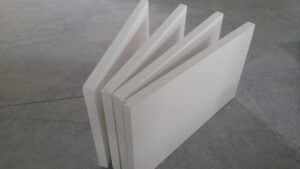 Calcium silicate (CS) board offers a unique combination of high-temperature thermal resistance and good acoustic performance, though specific values depend heavily on the board’s density and application.
Calcium silicate (CS) board offers a unique combination of high-temperature thermal resistance and good acoustic performance, though specific values depend heavily on the board’s density and application.
Thermal Insulation Properties
Calcium Silicate is primarily known for its exceptional high-temperature thermal resistance and use as fire protection.
- Low Thermal Conductivity: CS boards have a naturally low thermal conductivity, making them effective thermal insulators. Typical values for thermal conductivity () are in the range of to at various temperatures, depending on the board’s density and composition.
- High-Temperature Use: In industrial and refractory applications, specialized CS boards maintain very low conductivity even at extremely high service temperatures, often up to (). This feature is vital for insulating furnaces and high-heat equipment.
- R-Value (Thermal Resistance): The R-value of a single CS board is generally moderate compared to dedicated lightweight insulation materials (like foam or fiberglass batts).
- A sample construction board may have an R-value around (which converts to to for a single board).
- Context is Key: The primary thermal benefit for general construction comes from its fire-resistant barrier and stability, rather than providing the main bulk of thermal insulation in a wall cavity, which is typically filled with lighter materials
Acoustic Insulation Properties
CS boards perform well in noise reduction due to their density and mass, providing both sound insulation (blocking noise) and some degree of sound absorption.
- Sound Transmission Class (STC): The STC rating measures the board’s ability to block airborne sound. CS boards are often used as the face layer in high-performance acoustic partitions.
- A typical partition system using a CS board assembly (which includes studs and likely cavity material) can achieve an excellent STC rating, sometimes as high as .
- Thickness and Density: Thicker and higher-density boards offer better soundproofing, especially for low-frequency noise. Partition systems using to boards generally provide improved acoustic performance over standard boards.
- Acoustic Absorption: Some specialized, lower-density CS boards or perforated CS ceiling tiles are engineered to have sound-absorbing properties (measured by Noise Reduction Coefficient or NRC), reducing echo and reverberation within a room. For acoustic applications, a density of is often recommended
Calcium silicate (CS) board offers a unique combination of high-temperature thermal resistance and good acoustic performance, though specific values depend heavily on the board’s density and application.
Thermal Insulation Properties
Calcium Silicate is primarily known for its exceptional high-temperature thermal resistance and use as fire protection.
- Low Thermal Conductivity: CS boards have a naturally low thermal conductivity, making them effective thermal insulators. Typical values for thermal conductivity () are in the range of to at various temperatures, depending on the board’s density and composition.
- High-Temperature Use: In industrial and refractory applications, specialized CS boards maintain very low conductivity even at extremely high service temperatures, often up to (). This feature is vital for insulating furnaces and high-heat equipment.
- R-Value (Thermal Resistance): The R-value of a single CS board is generally moderate compared to dedicated lightweight insulation materials (like foam or fiberglass batts).
- A sample construction board may have an R-value around (which converts to to for a single board).
- Context is Key: The primary thermal benefit for general construction comes from its fire-resistant barrier and stability, rather than providing the main bulk of thermal insulation in a wall cavity, which is typically filled with lighter materials.
Acoustic Insulation Properties
CS boards perform well in noise reduction due to their density and mass, providing both sound insulation (blocking noise) and some degree of sound absorption.
- Sound Transmission Class (STC): The STC rating measures the board’s ability to block airborne sound. CS boards are often used as the face layer in high-performance acoustic partitions.
- A typical partition system using a CS board assembly (which includes studs and likely cavity material) can achieve an excellent STC rating, sometimes as high as .
- Thickness and Density: Thicker and higher-density boards offer better soundproofing, especially for low-frequency noise. Partition systems using to boards generally provide improved acoustic performance over standard boards.
- Acoustic Absorption: Some specialized, lower-density CS boards or perforated CS ceiling tiles are engineered to have sound-absorbing properties (measured by Noise Reduction Coefficient or NRC), reducing echo and reverberation within a room. For acoustic applications, a density of is often recommended.
Comparison Summary
| Property | Calcium Silicate Board Performance | Key Metric |
| Thermal Conductivity | Low to Very Low. Excellent for high-heat environments. | to |
| Temperature Resistance | Superior. Non-combustible, offering fire protection up to +. | Fire Rating: A1 (Non-combustible) |
| Acoustic Insulation | Good to High. Effective at blocking sound, especially in partition assemblies. | STC: to (for a full wall assembly) |
OCT
2025
